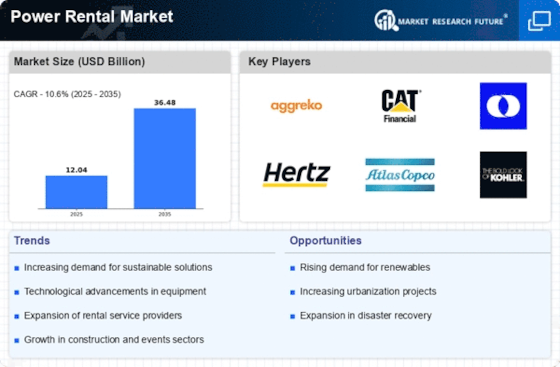Market Share
Power Rental Market Share Analysis
The surge in power consumption is particularly prominent in developing nations outside the Organization for Economic Cooperation and Development (OECD). The robust economic growth and population expansion in these regions have contributed significantly to the escalating demand for power. The development of these countries, coupled with an improvement in the standard of living, has generated a heightened need for energy consumption. Notably, as nations experience substantial economic growth, there is a concurrent increase in the demand for improved housing, leading to a higher requirement for energy in construction activities. This surge in energy demand, driven by economic and infrastructural developments, consequently fuels the growth of the power rental market. The World Bank reports a consistent increase in energy consumption globally. Comparing figures from 2010 to 2014, there has been a notable rise in energy consumption per capita. In 2010, the per capita energy consumption was recorded at 2,956.6 kWh, which increased to 3,144.4 kWh in 2014. This upward trajectory underscores the growing reliance on energy resources, reflecting the expanding needs of developing nations.
The economic growth in non-OECD nations has played a pivotal role in driving the surge in power consumption. As these nations experience rapid economic development, there is a parallel increase in industrialization, urbanization, and infrastructure projects. These factors collectively contribute to a higher demand for electricity. Furthermore, the population expansion in these regions intensifies the need for energy to support the growing communities and their evolving energy requirements.
The improvement in living standards is another crucial factor amplifying the demand for power. As citizens in developing nations experience an enhancement in their quality of life, there is a natural inclination towards modern amenities and technologies that necessitate increased energy consumption. Residential, commercial, and industrial sectors all witness a surge in energy needs, further propelling the overall power consumption in these regions.
Additionally, the construction boom triggered by economic development and urbanization significantly contributes to the escalation of power consumption. The demand for energy-intensive construction activities, such as building infrastructure, housing, and commercial spaces, rises in tandem with economic growth. This trend directly translates into an increased demand for power rental solutions to cater to the temporary and dynamic energy requirements associated with construction projects.
In conclusion, the rise in power consumption is intricately linked to the economic growth, population expansion, and improved living standards in developing non-OECD nations. The surge in energy needs, driven by industrialization, urbanization, and infrastructure development, highlights the critical role of power rental solutions in meeting the dynamic and evolving energy demands of these regions. As these nations continue on their growth trajectory, the demand for reliable and flexible power solutions is expected to persist, further shaping the landscape of the power rental market.


















Leave a Comment